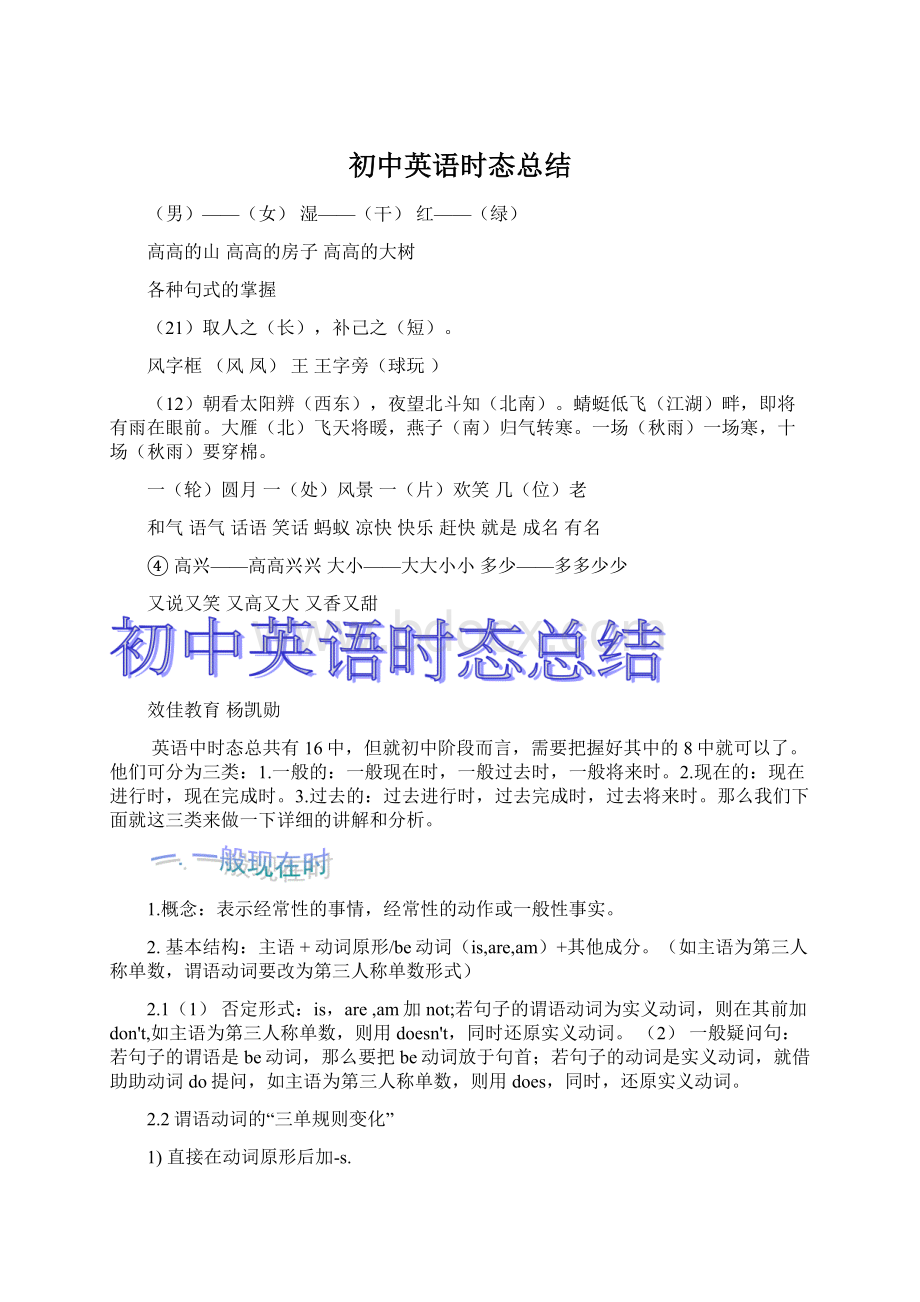初中英语时态总结Word格式文档下载.docx
《初中英语时态总结Word格式文档下载.docx》由会员分享,可在线阅读,更多相关《初中英语时态总结Word格式文档下载.docx(21页珍藏版)》请在冰豆网上搜索。

t,如主语为第三人称单数,则用doesn'
t,同时还原实义动词。
(2)一般疑问句:
若句子的谓语是be动词,那么要把be动词放于句首;
若句子的动词是实义动词,就借助助动词do提问,如主语为第三人称单数,则用does,同时,还原实义动词。
2.2谓语动词的“三单规则变化”
1)直接在动词原形后加-s.
ask---askswork---worksget---getsstay---stays
2)以字母s,x,ch,sh或o结尾的动词,在词尾直接加-es.
watch---watcheswish---wishesfix---fixes
do---doesgo---goespass---passes
3)以“辅音字母加-y”结尾的动词,要先变y为i再加-es.
try---triesstudy---studiescry---criesfly---flies
3.用法
a)表示现在经常性或习惯性的动作。
Mysisterwearsglasses.我妹妹戴眼镜。
Heoftengoestothecinema.他经常去看电影。
【注】询问某人的习惯时,有时还可用ever。
如:
“Doyouevereatmeat?
”“No,Inevereatmeat.”“你吃肉吗?
”“从不吃肉。
”
b)表示现在(或经常性)的情况或状态。
Motherisill.母亲病了。
Heisalwayslikethat.他总是那样。
c)表示现在的能力、特征、职业等。
Hesingswell.他唱歌唱得好。
Mr.SmithteachesFrench.史密斯先生教法语。
d)表示客观真理、科学事实、格言以及不受时间限制的客观存在。
Summerfollowsspring.春去夏来。
Knowledgeispower.知识就是力量。
Theearthturnsaroundthesun.地球绕着太
4.标志词:
通常与一般现在时连用的词有:
always,usually,often,sometimes,everyweek(day,year,month…),onSundays,everyday,inthemorning,onceaweek,threetimesaweek等
练习题
1._________Aliceoftenplaythepiano?
.No,she__________.
A.Do;
doB.Does;
doesC.Does;
doesn’t
2.________yourpenfriend_______inBeijing?
liveB.Do;
livesC.Does;
live
3.TomandMike_______veryexcited,theywilltakeatrip.
A.isB.areC.am
4.Ilike________verymuch.Whataboutyou?
A.danceB.dancedC.dancing
5.Ican’tfindmypen.Letme_______.
A.goandaskherB.goandaskhersC.goandaskshe
6.Fangfangisagoodstudent.She_______math.
A.doesgoodatB.welldoitC.isgoodat
7.Thekite_______abird.A.looklikeB.islookingC.lookslike
8.BillandI_______goodfriends.
9.Sandyoften________hishomeworkonSundays.
A.doB.doesC.did
10.Whatdoyouusuallydoontheweekend?
I__________.
A.wentswimmingB.goswimmingC.visitedgrandparents
11.Whatdoyouusuallydoonyourholiday?
A.sawelephantsB.singanddanceC.tookpicture
12.I________astudent.Igotoschool_______buseveryday.
A.is;
byB.am;
onC.am;
by
13.I_______abrother.She_______asister.
A.have;
hasB.has;
hasC.have;
have
14.You_________astudent.He________ateacher.
A.is;
isB.are;
isC.are;
are
15.Healways_________footballgames.
A.watchesB.watchC.doesn’t
16.Mybestfriend_______shells.
A.collectsB.collectC.often
17.Shedoesn’t________listeningtothemusic.
A.oftenB.likeC.likes
18.MymotherandI_________alwayswatchromanticfilms.
A.doesn’tB.don’tC.do
19.---When_______hegethomeonFriday?
----HegetshomeatfouronFriday.
A.doB.doesC.did
20.Summer_________spring.
A.comesafterB.comesinC.comesbefore
过去某个时间里发生的动作或状态;
过去习惯性、经常性的动作、行为。
2.基本结构:
主语+动词的过去式/be(was/were)+其他成分
2.1
(1)否定形式:
若是be动词其形式为:
was/were+not,若是实义动词的过去式,就在实义动词前加didn'
(2)一般疑问句:
was或were放于句首;
用助动词do的过去式did提问,同时还原实义动词。
2.2动词原形变过去式的规则变化
●直接加ed
work—workedlook—lookedplay—played,
●以e结尾的单词,直接加d:
live—livedhope—hopeduse—used,
●以辅音字母+y结尾的,变y为i加ed
study——studiedcarry—carriedworry—worried,
●以元音字母+y结尾的,直接加ed
enjoy—enjoyedplay—played
●以重读闭音节结尾的,双写最后的辅音字母+ed
stop—stoppedplan—planned
3.用法
1)表示过去某时间发生的动作或存在的状态。
Igotupatsixthismorning.今天早上我六点起的床。
Wevisitedthefactorylastweek.上周我们参观了那个工厂。
2)表示过去的习惯或经常发生的动作。
WhenIwasinthecountryside,Ioftenswamintheriver.
当我在乡下时,我常常在河里游泳。
4.标志词
ago,yesterday,thedaybeforeyesterday,lastweek,last(year,night,month…),in1989,justnow,attheageof5,oneday,longlongago,onceuponatime,etc.
一般过去时练习:
写出下列动词的过去式
is\am_________
fly_______
study________
are________
drink_________
play_______
go________
make________does_________
dance________
worry________
ask_____
taste_________
eat__________draw________
put______
have________stop_________
read_______
do________
二、句型转换。
1.TomlistenedtoCDsyesterday.(变否定句)
TomtoCDsyesterday.
2.FathersleptalldaylastMonday.(改一般疑问句)
FatheralldaylastMonday?
3.Iwasverybusylastweek.(改否定句和一般疑问句)
Iverybusylastweek.youverybusylastweek?
4.Shetookthewalletawayfromthetable.(对划线部分提问)
Shethewalletawayfrom?
5.Lastweekend,shegotupveryearly.(对划线部分提问)
sheupveryearly?
6.Jimmyreadabookabouthistory.(对划线部分提问)
Jimmy?
7.Sallywenttothepoolyesterday.(改为一般疑问句)
________Sally________tothepoolyesterday?
8.Theyhadaparty2daysage.(改为否定句)
They_________________aparty2daysago.
9.WedidourhomeworklastFriday.(改为否定句)
We__________________ourhomework.
10.Herweekendwasveryinteresting.(划线提问)
__________________yourweekend?
11.Iplayedsocceronmycomputerlastweekend.(划线提问)
What_______you________onyourcomputerlastweekend?
12.DidhestudyEnglishwell?
(改为肯定句)
He_________Englishwell.
13.Itwastimeforlunch.(同义句)
Itwastime_________________lunch.
14.Hecan’tseeanythingontheblackboard.(同义句)
Hecan____________________ontheblackboard.
15、Hedidsomecleaningthismorning.(对划线部分提问)
hethemorning?
16、Myweekendwasverygood.(对划线部分提问)
Weekend?
17、Wewenttothemountainslastweekend.(对划线部分提问)
themountains?
18、Hedidhishomeworklastnight.(改为否定句)
Hehishomeworklastnight.
19、JohnwenttothezoolastSaturday.(对划线部分提问)
JohnlastSaturday?
20、Tomplayedfootballthisafternoon.(改为否定句)
Tomfootballthisafternoon.
21、BarryvisitedhisunclelastSunday.(改为一般疑问句)
BarryhisunclelastSunday?
22、Theywenttothebeachaweekago.(对划线部分提问)
Didtheyaweekago?
三、用所给动词的适当形式填空。
1、I(do)myhomeworkyesterdaymorning
2、Mybrother(go)tostudyinAmericalastyear.
3、Didyougo(visit)youruncleyesterday?
4、We(take)thetraintoShanghaiyesterday.
5、I(study)fortoday’smathtestlastnight.
6、We(have)funatyourbirthdaypartylastnight.
7、He(noteat)breakfastthismorning.
8、LastSundayafternoonwe(play)tennisand(clean)theroom.
9、LastnightI(study)geographyforanhour.
四、同义句转换
1.Itwastimeforbreakfast.
Itwastimebreakfast.
2.Didtheytakeawalkwiththeirpetdoglastyear?
Didtheyawalkwiththeirpetdoglastyear?
3.Doyouthinkeveryoneenjoyshisweekend?
Doyouthinkeveryone.
4.Herweekendwasverybusy.
Sheweekend.
5.Icanseenothingbecauseitisverydark.
Iseebecauseitisverydark..
一般将来时表示将来某一时刻的动作或状态,或将来某一段时间内经常的动作或状态。
或者表示计划、打算、准备做的事。
常常和表示将来的时间状语连用。
a.will(第二,三人称)/shall(第一人称)+do.b.主语+is/are/amgoingtodoing+其他成分。
2.1
(1)否定句:
在will/shall+not+do,shallnot和willnot的缩写式分别为shan'
t和won'
t.在be动词后直接加not.
(2)一般疑问句:
把be动词或者是will/shall提至句首即可。
3.用法:
(1)一般将来时表示将要发生的动作或情况。
例如:
Iwill(shall)arrivetomorrow.我明天到。
Willyoubefreetonight?
你今晚有空吗?
Wewon’t(shan’t)bebusythisevening.我们今晚不忙。
(2)在一般将来时的句子中,有时有表示将来时间的,有时没有时间状语,这时要从意思上判断是否指未来的动作或情况。
例如:
Willshecome?
她(会)来吗?
(3)在以第一人称I或we作主语的问句中,一般使用助动词shall,这时或是征求对方的意见(a),或是询问一个情况(b):
a.Whereshallwemeet?
我们在哪儿碰头?
b.Shallwehaveanyclassestomorrow?
明天我们有课吗?
在这类问句中,近年来也有不少人用will,特别是在美国。
HowwillIgetthere?
我怎么去?
(4)begoingto+动词原形
a.表示计划、打算、准备做的事。
Wearegoingtoputupabuildinghere.我们打算在这里盖一座楼。
Howareyougoingtospendyourholidays?
假期你准备怎样过?
b.表示即将发生或肯定要发生的事。
Ithinkitisgoingtosnow.我看要下雪了。
(5)用一般现在时表示将来的情况。
在主从复合句中,当主句为一般将来时时,在if,assoonas,until,when等引导的状语从句中用一般现在时代替一般将来时。
Ifitdoesn’trainthisafternoon,we’llhaveafootballmatch.
如果今天下午不下雨,我们将进行一场足球比赛。
4.标志词
tomorrow,thedayaftertomorrow,tomorrowmorning/afternoon/evening,nextyear/week/month/hour,in+段时间inthefuture,thisafternoon/Sunday/eveningfromnowon,oneday,someday(未来的)某天soon
实战演练
()1.There__________ameetingtomorrowafternoon.
A.willbegoingtoB.willgoingtobeC.isgoingtobeD.willgotobe
()2.Charlie________herenextmonth.
A.isn’tworkingB.doesn’tworking
C.isn’tgoingtoworkingD.won’twork
()3.He________verybusythisweek,he________freenextweek.
A.willbe;
isB.is;
is
C.willbe;
willbeD.is;
willbe
()4.There________adolphinshowinthezootomorrowevening.
A.wasB.isgoingtohaveC.willhaveD.isgoingtobe
()5.–________you________freetomorrow?
–No.I________freethedayaftertomorrow.
A.Are;
goingto;
willB.Are;
goingtobe;
will
C.Are;
willbeD.Are;
()6.Mother________meanicepresentonmynextbirthday.
A.willsgivesB.willgiveC.givesD.give
表示现阶段或说话时正在进行的动作及行为。
主语+be(am/is/are)+doing+其他成分(注:
其中be动词体现现在的时间。
且其没有任何实际的意义,只是与后面的现在分词一起构成句子的谓语。
)
主语+am/is/are+not+doing+其他成分。
(2)若变为一般疑问句,就把be动词放于句首即可。
2.2动词现在分词的变化规则:
1.直接+ing(例:
sleep+ingsleeping)
2.去掉不发音的e+ing(例:
bite----biting)
3.重读闭音节且末尾只有1个辅音字母,双写辅音字母+ing
Sit---sitting,plan---planningstop----stopping
4.以ie结尾变ie为y+ing(例:
die-dyinglie-lying)
1)表示此时此刻正在进行的动作。
----whatareyoudoing?
你在做什么?
----IamreadingEnglish.我正在读英语。
2)表示现阶段正在进行的动作或持续的状态。
Theyarestudyinghardthisterm.他们这学期学习一直很努力。
StevenisrunningafterKate.
3)go,leave,arrive,